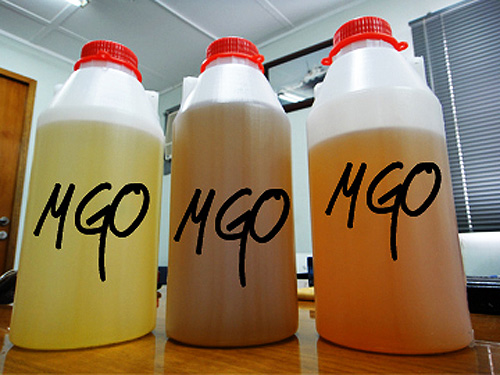Marine Gas Oil (MGO) is a type of heavy fuel oil commonly used as marine fuel for ships and other vessels. It is a lower-grade fuel than Marine Diesel Oil (MDO) and is typically used when a vessel is not underway and running on main engines. MGO has a higher sulfur content than MDO, and its emission characteristics are not as clean, making it a target of international regulations aimed at reducing the impact of shipping on the environment.
Properties of MGO
It is also less refined than MDO, making it a more cost-effective option for ship owners and operators. However, its high sulfur content makes it a more polluting fuel, emitting higher levels of sulfur dioxide (SO2) and particulate matter. The properties of MGO include:
High Viscosity and Density:
MGO has a higher viscosity and density than other fuels, making it a more viscous and heavier fuel. This can impact the fuel system’s performance and the engine, making the fuel more difficult to handle and transport.
Lower Refinement:
MGO is less refined than other fuels, such as Marine Diesel Oil (MDO), which makes it a more cost-effective option for ship owners and operators. However, the lower refinement level also contains higher impurities, including sulfur.
High Sulfur Content:
MGO has a high sulfur content, which makes it a more polluting fuel. High levels of sulfur in fuel oils can lead to emissions of sulfur dioxide (SO2) and particulate matter, which can have negative impacts on human health and the environment.
Less Clean Burning:
MGO has fewer clean-burning properties than other fuels, such as MDO. This can result in higher emissions of SO2 and particulate matter, which are significant contributors to air pollution.
Cost-Effective:
Despite its lower refinement level and more polluting properties, MGO remains a cost-effective option for ship owners and operators due to its lower cost than other fuels, such as MDO.
Uses of MGO
MGO is commonly used as fuel for marine diesel engines for propulsion and power generation. It is used when a vessel is not underway and running on main engines, such as when it is docked or in port. MGO is also used as fuel for auxiliary engines, such as those used for cargo handling or heating systems.

Regulations
Marine Gas Oil (MGO) is regulated in the United Kingdom by the Maritime and Coastguard Agency (MCA) and the Department for Transport (DfT). The regulations governing the use of MGO in the UK primarily focus on reducing its environmental impact, particularly in terms of sulfur emissions.
The UK has implemented the Sulphur Emissions Control Area (SECA) regulations in line with the International Convention for the Prevention of Pollution from Ships (MARPOL), which limit the sulfur content of fuels used by ships within designated SECA areas. The UK government is also actively pursuing further measures to reduce emissions from shipping, such as the Clean Maritime Plan, which encourages the uptake of cleaner fuels and alternative propulsion technologies.
Environmental impact
MGO significantly impacts the environment due to its high sulfur content and emissions of SO2 and particulate matter. SO2 is a significant contributor to air pollution, which can negatively affect human health and the environment, including respiratory problems and acid rain. Particulate matter is also a significant contributor to air pollution and has been linked to various health problems, including heart disease and lung cancer.
Alternatives to MGO
Several alternative fuels are available for use in the marine industry, including Marine Diesel Oil (MDO) and Liquefied Natural Gas (LNG). MDO is a cleaner burning fuel than MGO, with a lower sulfur content and lower emissions of SO2 and particulate matter. LNG is a cleaner fuel still, with virtually no emissions of SO2 or particulate matter.
However, adopting alternative fuels is slow in the marine industry due to the high conversion cost and the lack of infrastructure for the distribution and storage of alternative fuels. In addition, the high price of LNG compared to traditional fuels such as MGO has been a barrier to its wider adoption.
Conclusion
Marine Gas Oil is a commonly used fuel for marine diesel engines, but its use is regulated due to its high sulfur content and environmental impact. The shift towards cleaner burning fuels such as MDO and LNG is a response to international efforts to reduce the impact of shipping on the environment.
The marine industry is facing challenges in adopting alternative fuels, including the high conversion cost and the lack of infrastructure for distribution and storage. Nevertheless, the environmental benefits of cleaner fuels will drive the development and adoption of alternative fuels in the marine industry.MGO is a heavy fuel oil with a high viscosity and density compared to other fuels like FAME Biodiesel etc

